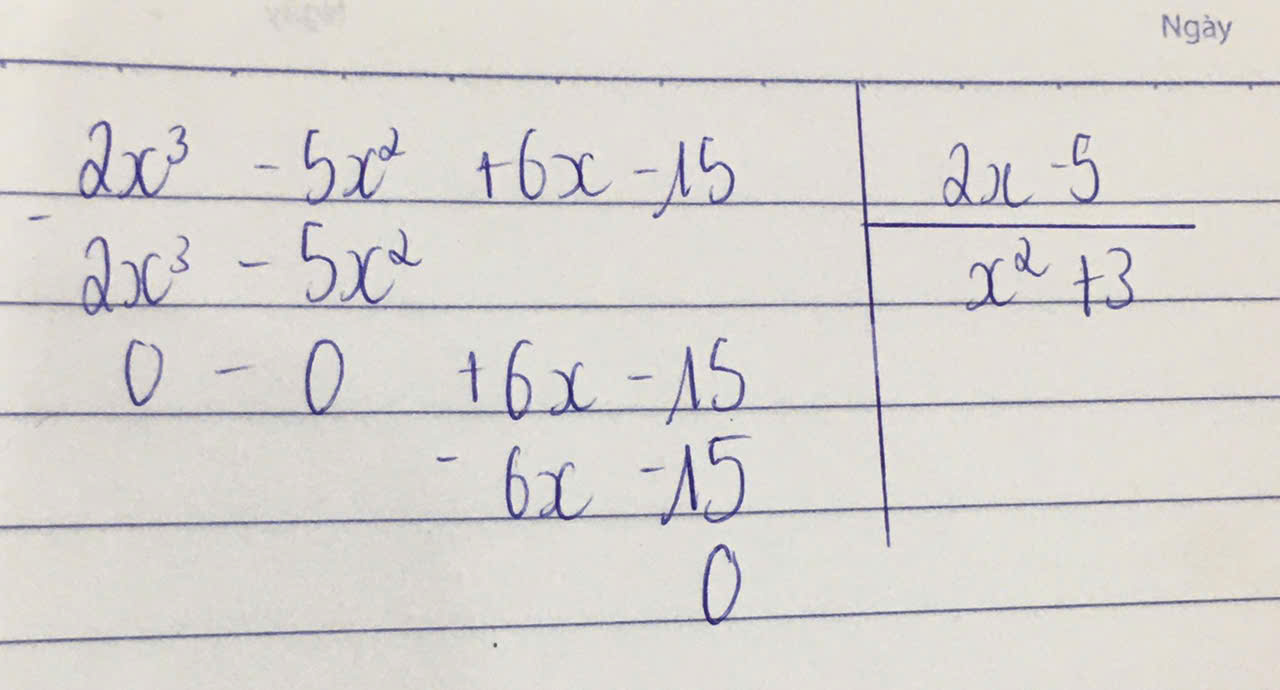
Hãy nhập câu hỏi của bạn vào đây, nếu là tài khoản VIP, bạn sẽ được ưu tiên trả lời.


A = x2 + 4xy + 3y3
A = 52 + 4.5.(-1) + 3.(-1)3
A = 25 + (-20) + (-3)
A = 2
Vậy: x2 + 4xy + 3y3 với x = 5; y = -1 là 2
B = x4 + x3 + 2x2 + x + 1
B = 34 + 33 + 2.(3)2 + 3 + 1
B = 81 + 27 + 18 + 3 + 1
B = 130
Vậy: x4 + x3 + 2x2 + x + 1 với |x| = 3 là 130

Thay \(x=\dfrac{1}{2}\) vào A, ta được:
\(A=3\cdot\left(\dfrac{1}{2}\right)^2-2\cdot\dfrac{1}{2}+1=\dfrac{3}{4}-1+1=\dfrac{3}{4}\)

\(\frac{1}{9}.3^4.3^x=3^7\)
\(\Leftrightarrow3^x=3^7:\frac{1}{9}:3^4=243\)
\(\Leftrightarrow3^x=3^5\)
\(\Leftrightarrow x=5\)

a,(\(6x-5x^2-15+2x^3:\left(2x-5\right)\)
\(\left(2x^3-5x^2+6x-15\right):\left(2x-5\right)\)


3.
a) \(\left(x-1\right)^3=125\)
=> \(\left(x-1\right)^3=5^3\)
=> \(x-1=5\)
=> \(x=5+1\)
=> \(x=6\)
Vậy \(x=6.\)
b) \(2^{x+2}-2^x=96\)
=> \(2^x.\left(2^2-1\right)=96\)
=> \(2^x.3=96\)
=> \(2^x=96:3\)
=> \(2^x=32\)
=> \(2^x=2^5\)
=> \(x=5\)
Vậy \(x=5.\)
c) \(\left(2x+1\right)^3=343\)
=> \(\left(2x+1\right)^3=7^3\)
=> \(2x+1=7\)
=> \(2x=7-1\)
=> \(2x=6\)
=> \(x=6:2\)
=> \(x=3\)
Vậy \(x=3.\)
Chúc bạn học tốt!

(x - 5)2 = 16
=> (x - 5)2 = 42
=> \(\orbr{\begin{cases}x-5=4\\x-5=-4\end{cases}}\)
=> \(\orbr{\begin{cases}x=9\\x=1\end{cases}}\)
(2x - 1)3 = -64
=> (2x - 1)3 = -43
=> 2x - 1 = -4
=> 2x = -4 + 1
=> 2x = -3
=> x = -3/2
( x - 5)2 = 16
=> (x - 5)2 = 42
=> \(\orbr{\begin{cases}x-5=4\\x-5=-4\end{cases}}\)
=> \(\orbr{\begin{cases}x=9\\x=1\end{cases}}\)
\(x^3:\left(-\dfrac{1}{2}\right)^2=\dfrac{1}{2}\)
\(\Rightarrow x^3:\left(\dfrac{1}{2}\right)^2=\dfrac{1}{2}\)
\(\Rightarrow x^3=\left(\dfrac{1}{2}\right)^2\cdot\dfrac{1}{2}\)
\(\Rightarrow x^3=\left(\dfrac{1}{2}\right)^3\)
\(\Rightarrow x=\dfrac{1}{2}\)
\(x^3:\left(-\dfrac{1}{2}\right)^2=\dfrac{1}{2}\Rightarrow x^3=\dfrac{1}{2}.\left(-\dfrac{1}{2}\right)^2=\dfrac{1}{2}.\left(\dfrac{1}{2}\right)^2=\left(\dfrac{1}{2}\right)^3\)
\(\Rightarrow x=\dfrac{1}{2}\)